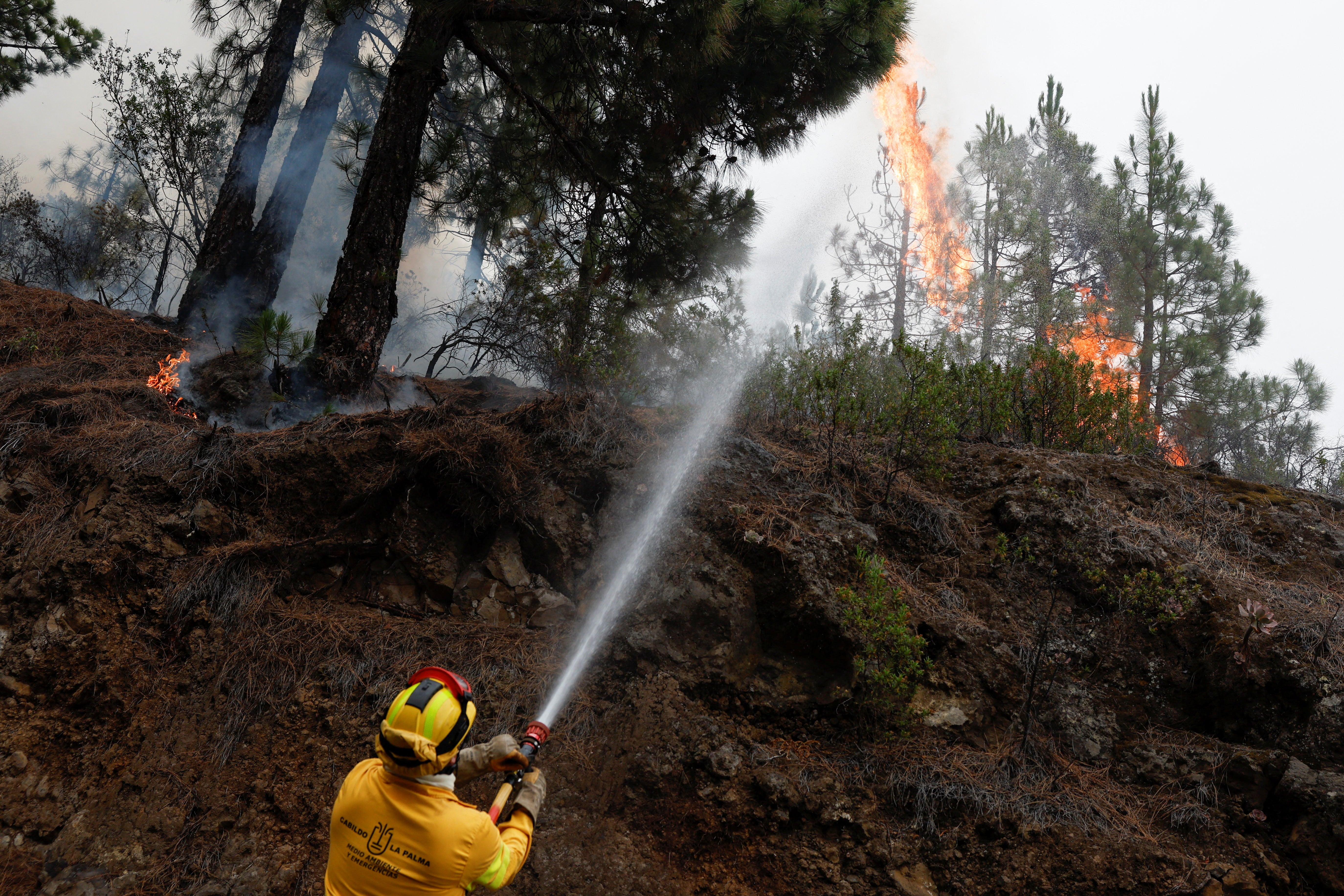How long is the heatwave in Europe expected to last?
Experts say extreme temperatures could continue for weeks with more records expected to be broken
Your support helps us to tell the story
From reproductive rights to climate change to Big Tech, The Independent is on the ground when the story is developing. Whether it's investigating the financials of Elon Musk's pro-Trump PAC or producing our latest documentary, 'The A Word', which shines a light on the American women fighting for reproductive rights, we know how important it is to parse out the facts from the messaging.
At such a critical moment in US history, we need reporters on the ground. Your donation allows us to keep sending journalists to speak to both sides of the story.
The Independent is trusted by Americans across the entire political spectrum. And unlike many other quality news outlets, we choose not to lock Americans out of our reporting and analysis with paywalls. We believe quality journalism should be available to everyone, paid for by those who can afford it.
Your support makes all the difference.Europe is set to continue to bake under extreme heat for weeks as global temperatures soar with more records expected to be broken.
Greece, which was battling to contain wildfires that prompted evacuations of thousands, was bracing for a second heatwave on Thursday, with temperatures exceeding 40 degrees Celsius (104 degrees Fahrenheit) in some areas.
The mercury is expected to rise further on Friday to a maximum of 44C.
Meanwhile, red alerts for extreme heat were in place in 23 cities in Italy on Wednesday after Rome recorded its hottest day ever on record at 41.8C.
The second round of heat last week was prompted by another anticyclone dubbed “Charon” – a character in Greek mythology who was the ferryman of the dead – which advanced into the Mediterranean region from North Africa.
The unrelenting heatwave has shown no sign of abating as millions of people in the northern hemisphere are being affected by scorching temperatures.
In fact, meteorologists predicted that temperatures in the coming days could keep climbing until they surpass Europe’s current record of 48.8C, set in Sicily in August 2021.
The World Meteorological Organization (WMO) told The Independent that “above normal temperatures” are expected to continue over the next week.

Ele Hands, Met Office’s deputy chief meteorologist, similarly told The Independent the heatwave across southern Europe and northern Africa is expected to “persist and slowly intensify” throughout the coming week, with the focus gradually moving towards southeast Europe.
The forecaster said many parts of Greece, Turkey, southern Spain, and Italy and its surrounding islands are set to reach temperatures as high as 45C.
Cathryn Birch, professor of meteorology and climate at University of Leeds, said “there is a chance” the hottest temperature record of 48C in Europe can be broken “over the next week”.
“The jet stream is stuck in a stationary wavey pattern, with high pressure over southern Europe,” she says.
“This is not forecast to change before the end of the month, possibly until mid-August. Temperatures across southern Europe will remain very high until the jet stream pattern changes.”
The Met Office alsosaid temperatures, some 8-12C above normal, will continue into August, although the extreme values of the preceding weeks will be increasingly less likely.
The highest temperatures are likely once again to be in Sicily, where absolute maximum temperatures could continue to exceed 40C into next week, said the forecaster.
The WMO spokeswoman also predicted the hot weather throughout the Mediterranean region and the Balkans could continue into next month. However, she said the UN agency does not yet know how intense the heat will be, nor if it will last until the end of August.

She said the question of whether there will be a new national temperature record also remains unknown. However, she did say individual station records will “certainly” break their daily records.
Her primary fear is that temperatures will stay high overnight as “that is when you really get the health risks”.
The Met Office has predicted overnight temperatures will hit close to 30C in the hottest spots.
France’s public health agency said the current stretch of hot weather would probably hospitalise or kill “many” people, as heat waves have done almost every summer since 2015.
The European Union's Copernicus Climate Change Service says 2022 and 2021 were Europe’s hottest summers on record, with scientists estimating more than 61,000 people died during the continent’s heatwaves last summer.
Robert Vautard, a climate scientist and director of France’s Pierre-Simon Laplace Institute said: "My worry is really health - the health of vulnerable people who live just below the rooftops of houses that are not prepared for such high temperatures. That could create a lot of deaths."

The Greek meteorological service had warned of a high risk of fire this week as holidaymakers have been evacuated from their homes amid intensifying wildfires near Athens that reached people’s doorsteps.
On Friday, firefighters continued to battle a reignited wildfire that has triggered a series of new evacuations. Authorities had declared the wildfire contained overnight but firefighters lost control later on Thursday when the winds gathered strength.
The country still has memories of a wildfire disaster in 2018, when a blaze killed 101 people in the seaside town of Mati, east of the capital.
The deadly heat in Europe comes as extreme temperatures, driven by climate crisis, are breaking records worldwide as both the US and China saw the mercury crossing 50C on Sunday.
Scientists have long warned that the climate crisis, caused by greenhouse emissions from burning fossil fuels, will make heatwaves more frequent, severe and deadly. They say governments need to take drastic actions to reduce emissions to prevent climate catastrophe.
“We are seeing heatwaves increasing in frequency, intensity, and duration – this trend is projected to continue, and western Europe is expected to be at particular risk,” says Dr Vikki Thompson, climate scientist at Royal Netherlands Meteorological Institute.



Join our commenting forum
Join thought-provoking conversations, follow other Independent readers and see their replies
Comments